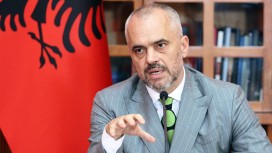His hair is receding, his beard is splashed with grey, and he speaks English with the grammatical precision of an independent-minded Balkan intellectual who grew up in the communist era – which is exactly what he is. But Edi Rama, Albania’s prime minister, is also so tall and muscular that, as a young man, he played for the national basketball team. Before he gave up art for politics in the post-communist era, his paintings were exhibited in Berlin, New York and beyond.
As he explained over dinner in Tirana on Thursday night, he is also old enough – he turns 51 on Saturday – to have searing memories of the cruel, isolated madhouse that was Albanian communism under Enver Hoxha, the dictator who ruled from the end of the second world war until his death in 1985. This is why Rama passionately wants Albania’s future to be in the EU, and why he foresees danger ahead if his and other Balkan countries are denied this prospect.
“Enlargement fatigue [in western European countries] is a kind of self-indulgence for those who have lost the point of why the EU was built in the first place. I am sure the founding fathers of the EU would be ashamed. My humble view is that Europe needs the Balkans today as much as the Balkans needs Europe. That is because enlargement into the Balkans is, first and foremost, an issue of security for Europe.”
When one dinner guest asked the premier if he felt “alone” because of the EU’s reluctance to embrace Albania with a timetable for membership, he reminded us that Albania under Hoxha was one of the world’s most paranoid, self-isolated regimes. It was a place where atheism was the state religion and private car ownership, beards and long hair were banned.
Small bunkers, built for partisans to shoot at mythical invaders, pitted towns, rural areas and the coast, in fact the whole country, like a form of demented concrete acne. Foreign travel was utterly inconceivable for ordinary Albanians. Contact with foreign ideas spelled trouble with the police, imprisonment or worse. Communism in eastern Europe was bad, but the nightmarish version in Albania was off the radar screen.
“I had the first part of my life so lonely under Enver Hoxha that I couldn’t possibly feel alone now. I’ve stopped telling my son about those times, because he looks at me as if I’m crazy. People in the 1970s were put in prison for having Picasso books,” Rama said.
In a warning about the potential risk of radical Islam spreading into the Balkans, he said: “A young person in Tunis or Tobruk feels he has no future. But in Albania the star in the sky is Europe. If the EU is not able to show up in the way that is expected, there will be a huge space for radical Islam.
“In our Balkan region, there are the most pro-American and pro-European Muslims in the world,” he said, referring to Muslim communities in Albania, Kosovo and Bosnia-Herzegovina. “But it’s changing, it’s not like it was even 10 years ago. Ten years ago, it would have been impossible for there to be foreign fighters from Albania [fighting in Iraq or Syria]. About 98 per cent of people believed in America, then in God, then in Europe. Today that’s not the case.”
Rama also speaks perceptively about the Greek crisis, and its impact on political mindsets in Athens and the wider Balkan region. “Before the crisis, the Greeks were the ‘first Europeans’ in the neighbourhood, the ‘big brother that knows the world’. They were the only Nato and EU member. But the crisis has forced them to abandon the area a bit. Antonis Samaras, the former premier, made a respectable effort to bring back Greece, but now [under the radical leftist-led government of Alexis Tsipras] things have changed again.”
As he knots his wine-red tie under his dark blue suit and prepares to leave the dining room, Rama tells a story about his grandmother, a Catholic like himself. “She said to me, ‘One day you will be a man. And a man can be brutal. A man can lie. A man can make wrong decisions. But what a man can never afford to be is boring.’”
Edi Rama, you sure listened to that advice.

No comments:
Post a Comment